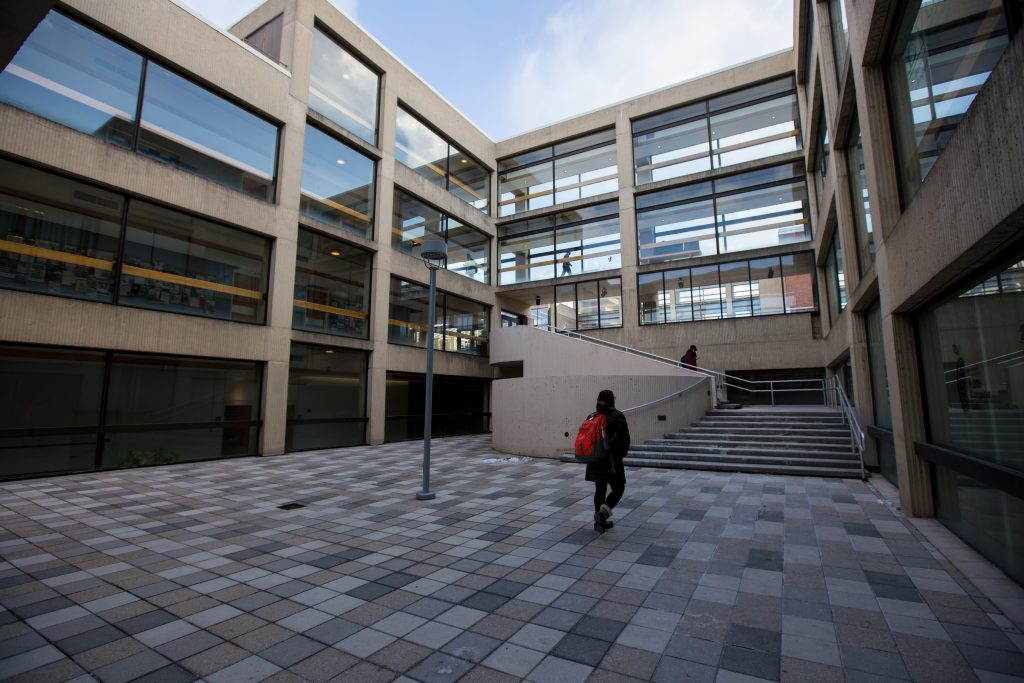Binghamton University has risen into the Research I University category in the Carnegie Classification of Institutions of Higher Education rankings, data that is used to compute other college rankings, including the ones seen in the U.S. News & World Report and the Princeton Review.
The University’s entrance into the category indicates that BU’s students and faculty members are conducting a high amount of research activity. Currently, there are 131 institutions, all of which are doctoral-granting universities, in the United States that are classified as a Research I University, including Stony Brook University, the University at Albany and the University at Buffalo.
The level of research activity is calculated based on a research activity index, including the aggregate level of research activity as well as obtaining the per capita research activity. To obtain the Research I title, a university must be able to provide a large number of resources available for research as well as have a great deal of students and faculty members conducting research.
Additionally, an institution must have been awarded at least 20 research or scholarship doctoral degrees during the most recent year. If the number is less than 20, then it must have awarded at least 30 professional practice doctoral degrees in at least two programs. Institutions also must have at least $5 million in total research and expenditures.
University President Harvey Stenger wrote in a statement that this title will impact BU as a whole.
“This is exceptional news that will have a far-reaching impact for Binghamton,” Stenger wrote. “This classification underscores the innovative work of our researchers as well as the importance of research funding on our reputation and for the growth of our graduate programs — two key measures that we are continually growing faster than our peers.”
In recent years, BU has taken steps to increase research funding and the number of doctoral degrees awarded, including hiring new faculty members, increasing the number of tenured and tenure-track faculty and increasing the number of graduate students attending the University. These are a few significant concepts that determine an institution’s Carnegie Classification, such as having research and development activity in science engineering, a research staff for science and engineering and doctoral degree offerings in an extensive amount of fields.
Celia Klin, a professor of psychology and senior associate dean of Harpur College, wrote in an email that the Carnegie ranking is recognition of the innovative research that BU conducts.
“Not only does the research provide answers to some of life’s important questions, it provides important educational opportunities for graduate students and undergraduate students,” Klin wrote. “Certainly, the public recognition of Binghamton University’s excellence in research should help us continue to attract excellent students, staff and faculty.”
But although the Research I title comes with higher prestige, some are concerned about BU’s ability to maintain the ranking. Tina Chronopoulos, an associate professor of classics and medieval studies, wrote in an email that while she believes the ranking will positively impact BU’s reputation, it could also produce issues regarding money and resources, particularly as the University battles a budgetary crisis.
“Maintaining this status will mean the University needs to continue to invest money in its people and research resources,” Chronopoulos wrote. “Given that there is a hiring freeze at the moment and just less money in general, I’m not sure how this can be done. Already, from my perspective as a humanities professor, things do not look ideal when it comes to library resources, for example.”
Chronopoulos also wrote that the University needs to focus on continuing to aid current faculty members and their research, highlighting issues with the demands of teaching, archival research and funding for humanities-based research, library resources and research-oriented travel.
“We already have talented and R1-trained faculty at this campus, and I would like to see continued investment in their research [and] needs,” Chronopoulos wrote. “In other words, looking to the future and building up the University is good, but you need to keep shoring up those folks who already are here.”
However, the new ranking may also push the University to increase its focus on undergraduate research. Donald Nieman, provost and executive vice president for academic affairs, wrote in an email that high levels of research at the University benefit undergraduates by creating opportunities for creative work and the ability to work in various programs, such as the Freshman Research Immersion Program, the Source Project and the Institute for Advanced Studies in the Humanities’ Independent Undergraduate Research Experience.
“Our goal is to continue to increase research and the quality of undergraduate education, assuring that research contributes to the opportunities all students have on our campus,” Nieman wrote.



